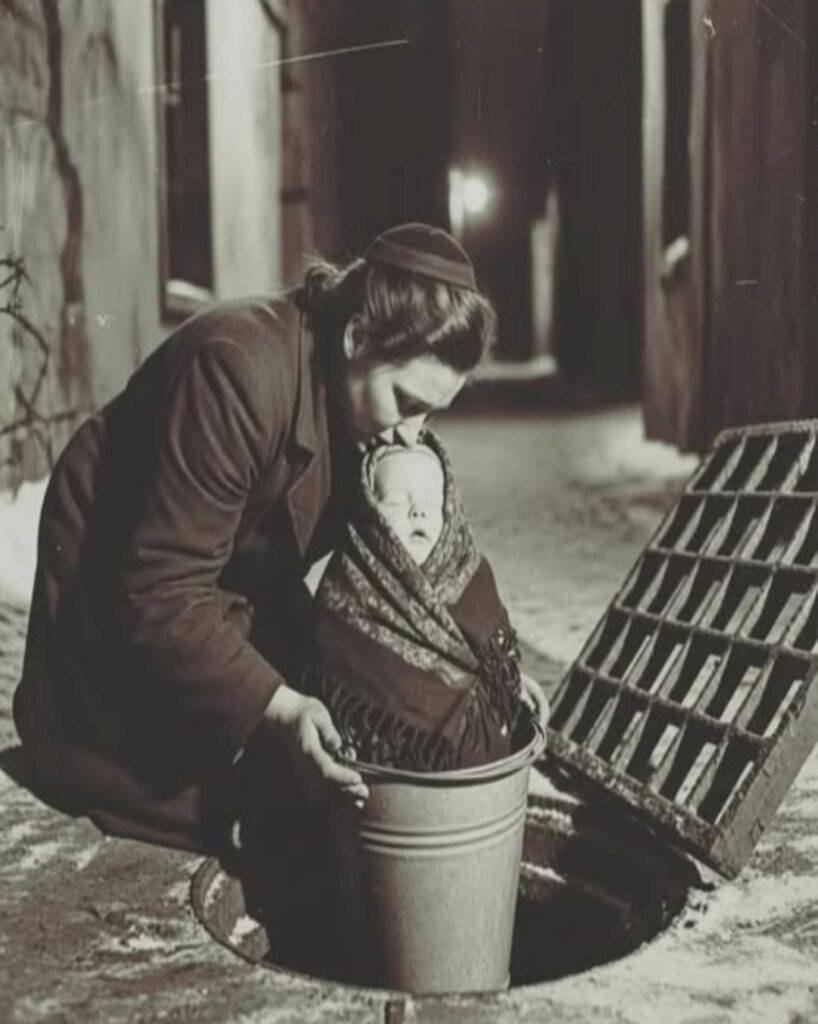
In the winter of 1943, when the Lviv Ghetto was gripped by starvation, disease, and fear, one unnamed Jewish mother made a choice that would alter the course of history—not for herself, but for her infant son. It was a choice born from desperation, shaped by courage, and remembered decades later as one of the quietest, yet most profound acts of love.
By then, life inside the ghetto had collapsed into horror. Food was scarce, deportations constant, and every passing day brought another trainload of souls bound for death camps. For parents, the nightmare was unrelenting: how to keep a child alive in a world designed to erase them.
This mother, facing the inevitable, found an impossible sliver of hope. She had made contact with Polish sewer workers—ordinary men who took extraordinary risks by guiding Jewish families through the underground tunnels beneath the city. The sewers were dark, foul, and suffocating, yet they offered one thing the ghetto could not: the possibility of survival.

On one brutal night, so cold the stones themselves cracked, the mother wrapped her baby in the only protection she had—a thin shawl—and placed him into a metal bucket. Her hands trembled, not from the freezing air, but from the gravity of the moment. As the child was lowered through a manhole into the blackness below, she whispered the last words he would ever hear from her: “Grow where I cannot.”
She did not follow. She stayed behind, fully aware of what awaited her. She had chosen her fate, so that her son might have a future.
The sewer worker who received the bucket in the shadows cradled the infant against the stench and darkness. Navigating the labyrinth of tunnels, he carried the baby beyond the walls of the ghetto and into fragile freedom. Against all odds, that child lived.
The mother’s name was never recorded. There is no photograph of her face, no grave to mark her sacrifice. History, in its cruelty, swallowed her identity. Yet her act remained, carried not in documents or monuments, but in the living breath of the boy she saved.
That boy grew into a man. He lived through the war, built a life, and grew old—proof of his mother’s final gamble. Decades later, with hands weathered by time, he returned to Lviv. Standing over a rusted manhole cover, he laid a single red rose on the metal that once opened into the sewer below.
“This,” he whispered, “was my beginning.”
There, on cracked pavement above the tunnels that had carried him to life, he honored the mother he never got to remember. The woman who gave him everything by giving him away. The mother whose love did not need a name to endure.
Her story, though nearly lost, echoes across generations. It reminds us that even in the most desperate circumstances, human love finds ways to defy destruction. That in the face of annihilation, a mother’s instinct to protect her child can outshine even the darkest cruelty.
The Holocaust left behind six million silences—names, voices, and lives erased. Yet within that silence are stories like this one, whispered through survivors, remembered in fragments, and passed on as proof that love can survive even where life cannot.
The man who once lay in that bucket was not just a survivor. He was a living testament to his mother’s decision, her sacrifice, and her hope. And by returning to the place where her story ended and his began, he made certain that her love—unrecorded, unnamed, but eternal—would never be forgotten.
Some acts of courage are remembered with monuments. Others live in memory, in whispered words, and in the lives they protected. This was hers.
